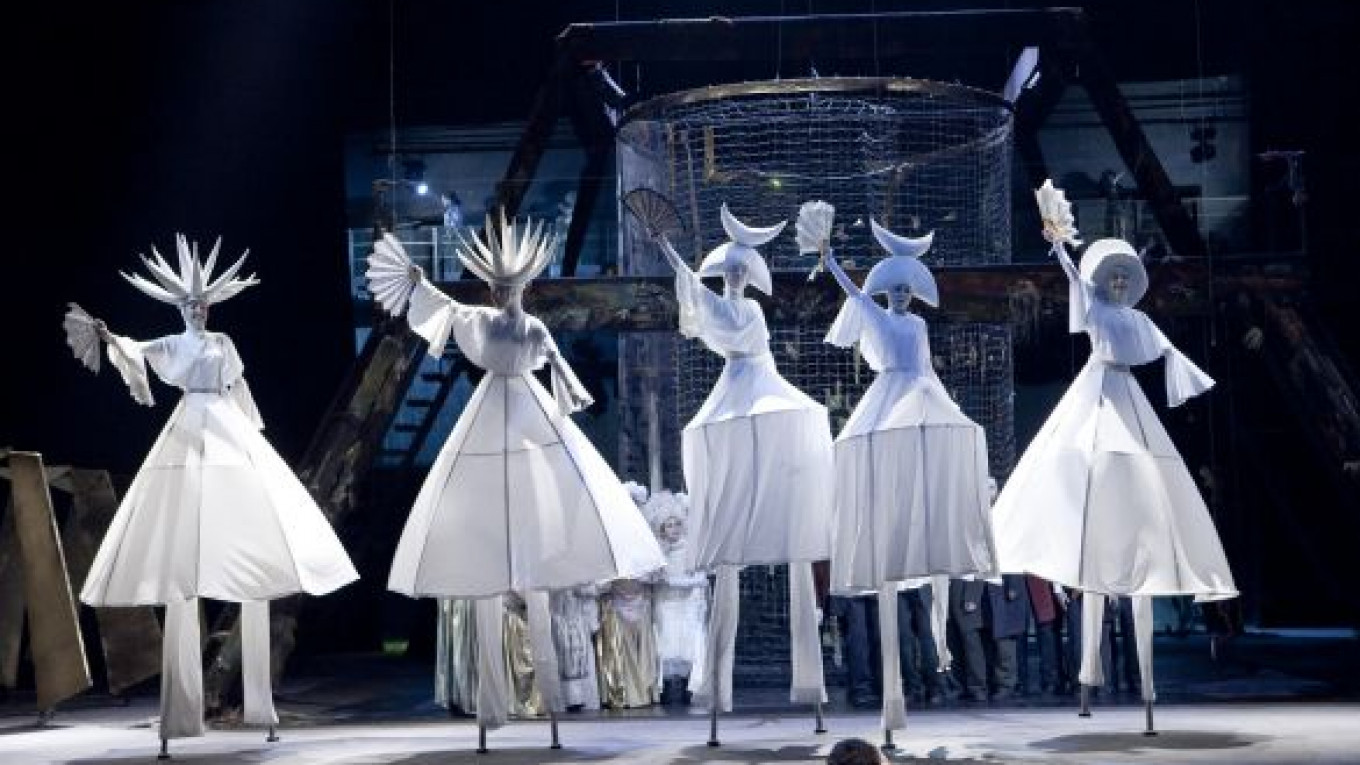Call this the year that the drama category of the Golden Mask Festival joined the modern world.
Don’t get me wrong. This showcase, which, in its full bloom, annually honors the finest achievements in drama, opera, dance and puppetry, has long been an important measuring stick for what Russian directors are up to. But let’s be honest — contemporary plays have only rarely been a part of the party since the festival was founded in the mid-1990s.
Even this year the percentage of drama nominees based on new Russian plays is low — it comes in right at 25 percent. But six out of 24 nominees isn’t bad when you consider that there were just three last year, one in 2009 and two in 2008. Many years there have been none at all.
A few stray performances of productions nominated for Golden Mask awards have already taken place, but the traditional competition segment of the festival gets underway in earnest this week. Shows whose directors, actors and designers are nominated for their work in the 2009-10 season will perform daily from now through mid-April.
Part of the reason for the increased recognition of new plays may be that the committee of experts nominated an enormous total number of shows — 19 in the two drama categories (large and small stage), and five in the Experiment category.
But the fact remains that the writers Vadim Levanov, Mikhail Durnenkov, Vyacheslav Durnenkov, Anna Baturina, Yelena Gremina and Nina Belenitskaya are comfortably mixed in with such perennials as Anton Chekhov, William Shakespeare and other fine, but long-lifeless writers.
Gremina and Belenitskaya’s plays — “One Hour Eighteen” and “My God Pavlik,” respectively — are nominated in the Experiment category. “One Hour” is a documentary drama based on events surrounding the death of attorney Sergei Magnitsky in prison in 2009. “Pavlik” is both reality and fantasy-based, as it turns on end the Soviet myth of the famous boy-hero Pavlik Morozov, who, according to legend, ratted to the authorities that his father was engaged in anti-Soviet behavior.
“Pavlik,” a production of the Joseph Beuys Theater, plays Thursday and April 1 to 3 in the space at Teatr.doc. “One Hour,” produced by Teatr.doc, plays Monday, Tuesday and April 9 and 10, in the Teatr.doc basement.
Yekaterinburg playwright Nikolai Kolyada has often been nominated for Golden Mask awards in the past for his work directing the classics. He is nominated again this year, but this time for staging a play by Baturina, one of his former writing students at the Yekaterinburg Theater Institute.
Baturina’s “Girl From the Front,” which touches on the topic of Russia’s experience in World War II, plays April 11 and 12 on the Drugaya Stage of the Sovremennik.
Moscow-based director Marat Gatsalov brings his production of Vyacheslav Durnenkov’s “Exhibits” to the Meyerhold Center on April 6 and 7. This production of the Prokopevsk Drama Theater tells the tale of a city torn apart by conflicting interests among its citizens.
Levanov’s contribution comes in the way of a bold, modern adaptation of “Hamlet” for Valery Fokin at the Alexandrinsky Theater in St. Petersburg. This show, incidentally, like two other Alexandrinsky nominees — Chekhov’s “Uncle Vanya” directed by Andrei Serban, and Andrei Moguchy’s production of Mikhail Durnenkov’s “Izotov” — will not be performed in Moscow during the festival because they played here in November during a Golden Mask-produced tour.
Several directors are making their first appearance at the Golden Mask, including Sergei Yumov, Mikhail Teplitsky, Konstantin Kuchikin and Irina Keruchenko. All are nominated for small-stage productions.
Yumov debuts with his dramatization of Andrei Platonov’s “The Return,” the poignant story of a soldier returning home from war. Produced at the Globus Theater in Novosibirsk, it plays April 3 and 4 at the Meyerhold Center.
Teplitsky’s rendition of a Sholem Aleichem story under the title of “The Main Thing Forgotten” represents St. Petersburg’s Takoi Theater, a rare commercial venue in Russia that is known for creating cutting-edge work. It plays April 2 and 3 on the old stage of the Fomenko Studio.
Kuchikin is nominated for his production of Marius Ivaskevicius’ “The Kid” for the Theater Yunogo Zritelya of Khabarovsk. It tells the story of a meteor that brings a new life to Earth, and it plays April 12 and 13 at the Mossoviet Theater Stage Pod Kryshei.
Keruchenko finds herself in the awkward position of being in competition with her former teacher Kama Ginkas, from whose directing class at the Moscow Art Theater school she graduated in 2005. She is nominated for her small-stage dramatization of Fyodor Dostoevsky’s story “The Meek One,” a tale about a marriage gone wrong, which plays April 10 at Moscow’s Theater Yunogo Zritelya.
Ginkas, who won a Best Director award for “The Lady With the Lapdog” in 2003, and who has had nine productions nominated in the festival’s 17 years, is up for awards this year with his production of “Medea” at the Theater Yunogo Zritelya. It plays Friday and April 2.
Other big-name directors in the running include Rimas Tuminas for Chekhov’s “Uncle Vanya” at the Vakhtangov Theater, Mindaugas Karbauskis for “A Stalemate Lasts But a Moment” at the National Youth Theater, Pyotr Fomenko for “Triptych” at the Fomenko Studio and Adolf Shapiro for “The Precipice” at the Chekhov Moscow Art Theater.
Yevgeny Marcelli, one of Russia’s finest directors from the so-called provinces, brings his production of Leonid Andreyev’s Silver-age classic, “Yekaterina Ivanovna,” to the Fomenko Studio New Stage on April 12.
Lev Erenburg, whose “The Storm” for the Pushkin Theater of Magnitogorsk was named Best Small Stage production in 2008, is nominated this year for his staging of Maxim Gorky’s “Vassa Zheleznova” at the Chekhov Moscow Art Theater. It plays March 30 and April 9.
In addition to “One Hour Eighteen” and “My God – Pavlik,” the Experiment category puts forth three other strong candidates for awards. Two of them — Dmitry Krymov and Alexander Bakshi’s “Tararabumbia,” and Alexander Ogaryov’s “Guidon” — are products of Moscow’s School of Dramatic Art.
The genre of “Tararabumbia” is designated by director Krymov and composer Bakshi as a “procession” of Anton Chekhov’s characters. Over a two-hour period the people of Chekhov’s plays march, dance, run and crawl along a moving sidewalk from one end of the hall to the other. It plays April 7 and 8 on the theater’s Manezh main stage.
“Guidon” is something of a mix between opera, ballet and drama, based on the writing of the Russian absurdist Daniil Kharms and composed by Alexander Manotskov. It performs April 1 and 2 on the theater’s Globus stage.
Rounding out the Experiment category is Boris Milgram’s production of Leonid Andreyev’s “Life of Man” for the Theater-Theater of Perm. Playing April 8 at the National Youth Theater, it is described by critic Alexander Vislov as a “feast for the eyes.”
The four puppet shows nominated represent theaters from three cities.
Moscow’s world-famous Obraztsov Puppet Theater presents its kids-friendly production of “Zolushka” on April 10 and 13. Also geared toward children are “Silly Griboulle and Mister Bumblebee” from the Yekaterinburg Puppet Theater (April 1 at the Theater Center Na Strastnom), and “Flyum-Pam-Pam” from the Skazka Puppet Theater of Abakan (April 8 and 9 at the Hermitage Theater).
Vladimir Biryukov’s puppet production of Chekhov’s one-act play “The Bear” is a piece apart in that it is an adult tale told with adult sensibilities. This humorous and often touching work, mounted at the Kostroma Puppet Theater, plays April 11 and 12 at Okolo, the Theater Near the Stanislavsky House.
The Golden Mask Festival runs at various venues until April 14. Tel. 662-5352, http://www.goldenmask.ru.
A Message from The Moscow Times:
Dear readers,
We are facing unprecedented challenges. Russia's Prosecutor General's Office has designated The Moscow Times as an "undesirable" organization, criminalizing our work and putting our staff at risk of prosecution. This follows our earlier unjust labeling as a "foreign agent."
These actions are direct attempts to silence independent journalism in Russia. The authorities claim our work "discredits the decisions of the Russian leadership." We see things differently: we strive to provide accurate, unbiased reporting on Russia.
We, the journalists of The Moscow Times, refuse to be silenced. But to continue our work, we need your help.
Your support, no matter how small, makes a world of difference. If you can, please support us monthly starting from just $2. It's quick to set up, and every contribution makes a significant impact.
By supporting The Moscow Times, you're defending open, independent journalism in the face of repression. Thank you for standing with us.
Remind me later.







